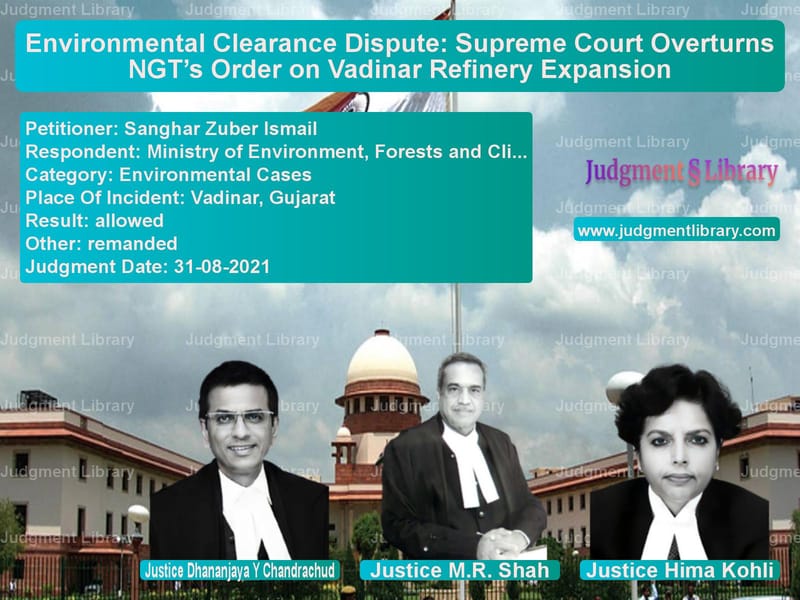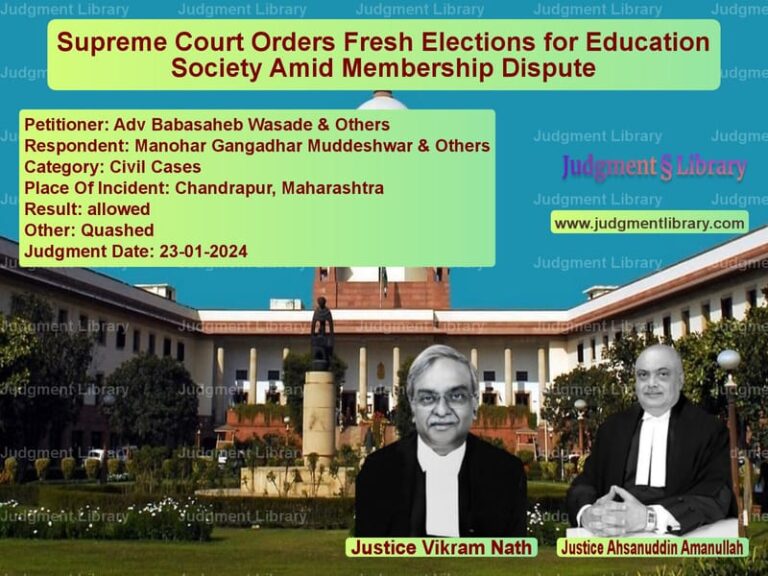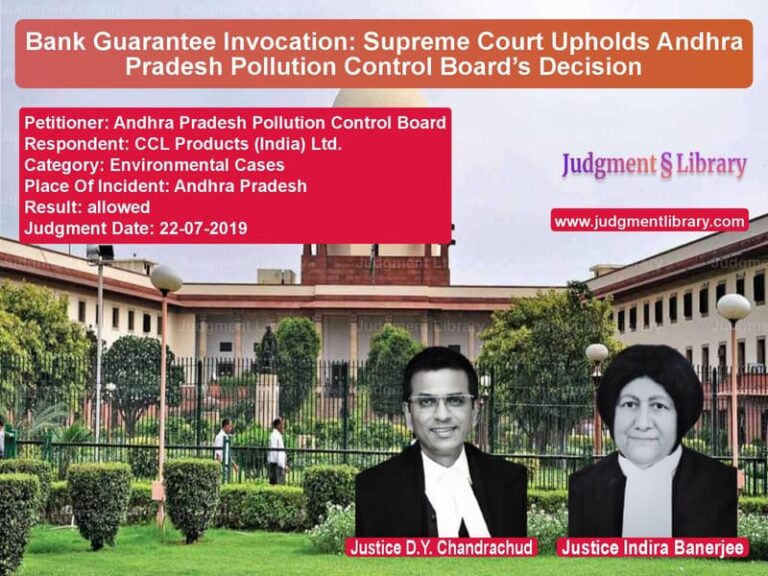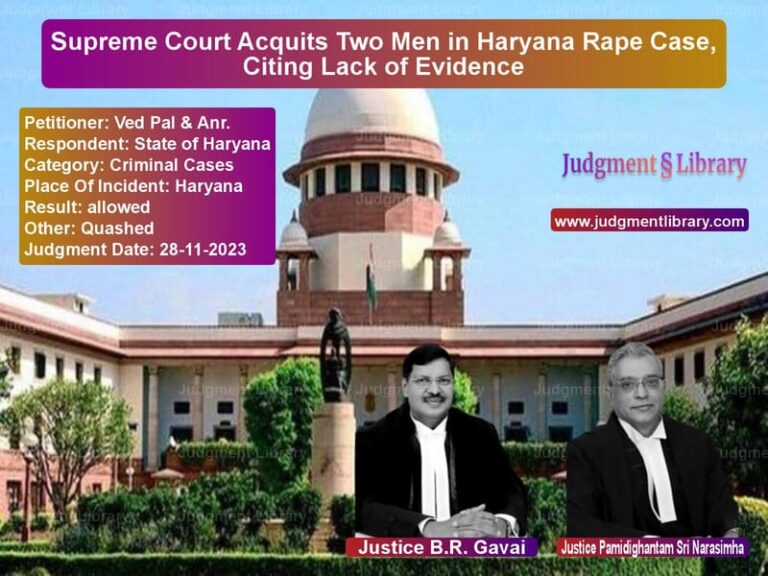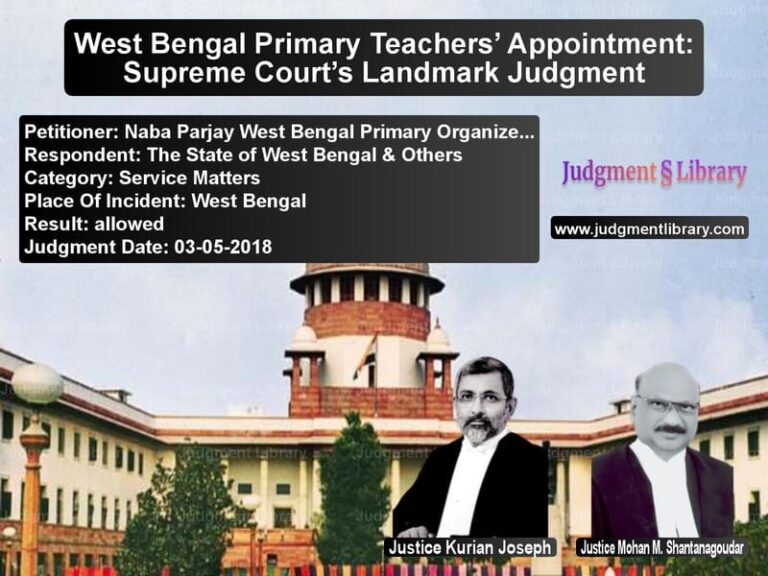Environmental Clearance Dispute: Supreme Court Overturns NGT’s Order on Vadinar Refinery Expansion
The case of Sanghar Zuber Ismail v. Ministry of Environment, Forests and Climate Change & Anr. is a significant ruling concerning environmental clearance (EC) for a major refinery expansion project in Vadinar, Gujarat. The Supreme Court found that the National Green Tribunal (NGT) had failed to exercise its appellate jurisdiction effectively by merely relying on assurances from the project proponent instead of conducting an independent review of the environmental concerns raised.
Background of the Case
The dispute arose when the Ministry of Environment, Forests, and Climate Change (MoEFCC) granted an environmental clearance on 5 January 2021 for expanding the refinery’s capacity from 20 MMTPA (Million Metric Tonnes Per Annum) to 46 MMTPA. The appellant, Sanghar Zuber Ismail, challenged this clearance before the NGT, arguing that the expansion posed a serious threat to marine biodiversity and mangroves in the region.
The refinery in question was located in a sensitive ecological zone, making its expansion a subject of environmental scrutiny. Given the potential impact on the marine ecosystem, including mangroves, the appellant raised concerns about the long-term sustainability of the project.
Key Issues Raised
- Whether the environmental clearance process followed due diligence in assessing the impact on marine ecosystems and mangroves.
- Whether the mitigation measures proposed by the project proponent were adequate.
- Whether the NGT, in its appellate jurisdiction, failed to apply its independent assessment of the case.
- Whether the reliance on expert committees by the NGT was sufficient to satisfy the principles of environmental law.
Petitioner’s Arguments
The appellant made the following arguments before the NGT:
- The project posed a significant threat to marine biodiversity, particularly the mangroves and aquatic life in the coastal region.
- The Environmental Impact Assessment (EIA) report, which served as the basis for granting the clearance, was inadequate and failed to address all environmental risks.
- The public consultation process was not conducted effectively, limiting the opportunity for affected communities and environmental activists to express their concerns.
- The project proponent did not demonstrate a robust plan to mitigate environmental damage, and the clearance was granted without due scrutiny.
- The expansion would lead to increased pollution levels in the surrounding areas, posing health risks to local communities.
Respondent’s Defense
The project proponent and MoEFCC defended the clearance, stating that:
- The EIA report had been duly prepared and reviewed by CSIR–NEERI (Council of Scientific and Industrial Research – National Environmental Engineering Research Institute).
- All environmental conditions set in the clearance would be complied with to ensure minimal impact on the ecosystem.
- A three-member expert committee was constituted to oversee the implementation of the environmental safeguards.
- The project had received all necessary approvals from regulatory authorities, ensuring compliance with environmental laws.
NGT’s Decision
The NGT, in its order dated 8 June 2021, dismissed the appeal filed by the petitioner. It primarily relied on the statement given by the project proponent, who assured that all EC conditions would be followed. While acknowledging the environmental concerns raised, the tribunal merely directed the project proponent to ensure compliance with mitigation measures.
The NGT’s judgment did not engage in a detailed scrutiny of the potential environmental hazards or the adequacy of the mitigation measures proposed. Instead, it constituted an expert committee to oversee compliance with environmental conditions but did not itself conduct an independent evaluation.
Supreme Court’s Analysis and Ruling
The Supreme Court found the NGT’s approach flawed and ruled that:
- The NGT failed to exercise its appellate jurisdiction properly by not conducting an independent review of the environmental concerns raised.
- Relying solely on the statement of the project proponent without an independent verification of the claims made was insufficient.
- Constituting an expert committee does not absolve the NGT from its duty to adjudicate on environmental disputes.
- The role of the NGT, as an expert judicial body, is to assess substantive environmental issues rather than simply rely on administrative assurances.
The Supreme Court observed:
“The adjudicatory function of the NGT cannot be assigned to committees, even expert committees. The decision has to be that of the NGT. The NGT has been constituted as an expert adjudicatory authority under an Act of Parliament. The discharge of its functions cannot be obviated by tasking committees to carry out a function which vests in the tribunal.”
Further, the Court emphasized the need for rigorous judicial scrutiny in environmental matters:
“The NGT has to apply its mind to the substantive grounds of challenge. It cannot merely base its conclusion on statements made by the project proponent but must independently verify the environmental impact.”
Final Judgment
The Supreme Court allowed the appeal and set aside the NGT’s order dated 8 June 2021. The case was remanded back to the NGT for a fresh hearing, instructing it to conduct a proper evaluation of the environmental concerns raised.
The Supreme Court directed that:
- The NGT must independently examine the impact of the project expansion.
- The concerns about marine biodiversity and mangrove destruction must be addressed with a scientific approach.
- The tribunal should not rely merely on assurances from project proponents but conduct a detailed analysis of the EIA and other environmental reports.
Impact of the Judgment
The ruling is a strong reaffirmation of the role of the NGT as an independent adjudicatory body responsible for scrutinizing environmental clearances. It prevents decision-making based on administrative assurances and ensures that substantive environmental concerns are given due consideration.
Key takeaways from the judgment include:
- Environmental governance must be based on rigorous legal and scientific scrutiny rather than administrative convenience.
- The NGT must actively engage in reviewing environmental risks rather than delegating this responsibility to expert committees.
- Communities affected by large-scale industrial expansion projects have the right to have their concerns addressed through judicial oversight.
Conclusion
The Supreme Court’s decision in Sanghar Zuber Ismail v. Ministry of Environment, Forests and Climate Change sets a crucial precedent for environmental litigation in India. It underscores the principle that environmental decision-making must be rooted in legal scrutiny and scientific evaluation. The ruling ensures that regulatory bodies and judicial forums uphold their responsibility to safeguard the environment while maintaining transparency in industrial expansion approvals.
Petitioner Name: Sanghar Zuber Ismail.Respondent Name: Ministry of Environment, Forests and Climate Change & Anr..Judgment By: Justice Dhananjaya Y Chandrachud, Justice M.R. Shah, Justice Hima Kohli.Place Of Incident: Vadinar, Gujarat.Judgment Date: 31-08-2021.
Don’t miss out on the full details! Download the complete judgment in PDF format below and gain valuable insights instantly!
Download Judgment: sanghar-zuber-ismail-vs-ministry-of-environm-supreme-court-of-india-judgment-dated-31-08-2021.pdf
Directly Download Judgment: Directly download this Judgment
See all petitions in Public Interest Litigation
See all petitions in Environmental Cases
See all petitions in Judgment by Dhananjaya Y Chandrachud
See all petitions in Judgment by Mukeshkumar Rasikbhai Shah
See all petitions in Judgment by Hima Kohli
See all petitions in allowed
See all petitions in Remanded
See all petitions in supreme court of India judgments August 2021
See all petitions in 2021 judgments
See all posts in Environmental Cases Category
See all allowed petitions in Environmental Cases Category
See all Dismissed petitions in Environmental Cases Category
See all partially allowed petitions in Environmental Cases Category

